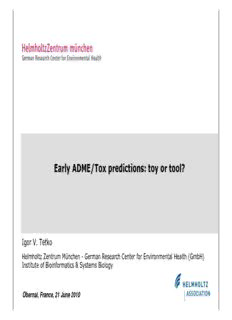
Early ADME/Tox predictions PDF
Preview Early ADME/Tox predictions
Early ADME/Tox predictions: toy or tool? Igor V. Tetko Helmholtz Zentrum München - German Research Center for Environmental Health (GmbH) Institute of Bioinformatics & Systems Biology Obernai, France, 21 June 2010! Helmholtz Zentrum München statistics • Previous name (before 2008): GSF (Forschungszentrum für Umwelt und Gesundheit GmbH) • Part of Helmholtz Network (2.35 Milliards Euro, 26500 people, 15 centers) • Leading center for Environmental Health in Germany • 25 institutes (1797 people, ca 700 scientists & 300 PhD students)* • 70 contracts with EU • Strong IPR and management support • Institute for Bioinformatics & Systems Biology ! 50 peoples, strong expertise in in silico data analysis, machine learning methods, software development, data dissemination (Web, Internet) *January 2008 Layout of presentation Productivity of R&D companies Importance of ADMETox parameters Overview of eADMETox properties/data Applicability Domain challenges • LogP benchmarking study • AD for qualitative models – AMES test Data integration OCHEM – On-line CHEmical database & Modeling environment Conclusions Pharma R&D Cost and Productivity: Fewer drugs, more expenditure" Approved drug 2008 – 24(3*); 2009 – 25(6*) *Biological license applications Potential ADME/T market (US $ billions)1" In vitro Toxicology ($0.2) ADME ($1.5) In vivo Toxicology ($1.3) It will grow up to US$ 4.4 billion up to 20122 1) Razvi, E.S. Drug and Market Development (2003). 2) http://www.researchandmarkets.com/reports/c84850 Pharma R&D: Cost and Productivity issues Compound numbers 1.000.000 Cpds <5000 Cpds < 500 Cpds < 5 Cpds Up to 15 Years: 1 drug Lead Lead Optimisation Lead Profiling Clinics Approval Discovery Target Discovery ADME/T ADME/T In vitro and in vivo ADME/T property determination: Millions of screens for solubility, stability, absorption, metabolism, transport, reactive products, drug interactions, etc etc Preclinics Costs: > $300m PER COMPOUND to reach approval Courtesy from Dr. Höfer ADME/T Absorption Size, lipophilicity, solubility, ionization, enters organism (by oral permeability, active transport administration) Distribution Affinity to different tissues, permeability, distributed between blood/ active transport plasma/tissues (e.g. brain) Metabolism Affinity to different enzymes bio-converting Elimination Active transport, size, lipophilicity, mechanisms and pathways for ionization, permeability (also for excretion of drugs metabolites) Toxicity undesired interactions of drug or Presence of toxicological its metabolites pharmacophores, liophilicity Interplay of physico-chemical properties with in vivo pharmacological activities/data Wang & Shkolnik, Chem. & Biodiversity, 2009, 6, 1887. Interest in Phys-Chem properties Wang & Shkolnik, Chem. & Biodiversity, 2009, 6, 1887.
Description: